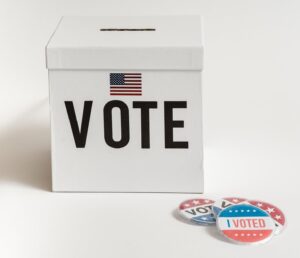Voting for Climate

From time to time, I get asked: what’s the most important thing I can do to address climate change? I always answer with two suggestions: talk about it and vote. Inaction on climate change arises because few Americans believe others around them share their concerns and because our policymakers are out of step with the popular desire to act now. Talking about climate change helps people see that a huge majority (85%) believes that we have a moral responsibility to create a safe and healthy climate. Voting your climate values ensures that the big systems-level changes that we need to solve climate change can be made.
In order to ensure the availability of clean energy, for example, government needs to accelerate the permitting and construction of transmission infrastructure. That’s not something we can do as individuals. We need to vote for officials that will act immediately to move climate solutions forward.
The accelerating pace of climate change – and limited time that we have remaining to meet our goals – makes 2024 an extremely important election year. The outcome of national races will determine whether America maintains the incredible progress on climate solutions that was made via the Bipartisan Infrastructure Law, the Inflation Reduction Act, and other orders and actions. Equally importantly, the outcome of local races will determine whether or not the country delivers on many of the provisions in those federal policies. Much of the implementation (and many of the direct household benefits) from those laws, after all, will be carried out at the state and local levels.
So, with “voting for climate” in mind, 2024 is an excellent time to get active.
1. Make a plan: Identify your local primary dates, mark election day (Nov 5th) on your calendar, identify your polling place, and register.
2. Make a commitment: Pledge now that you will vote for climate in 2024.
3. Talk to family, friends, and neighbors: Listen about their climate concerns and suggest they vote with climate in mind.
4. Attend a candidate forum (especially for local candidates): Make sure your candidates know that you care about climate change and ask that they commit to policies that will solve it.
5. VOTE!
For your conversations and candidate questions, remember to keep the “5 Steps” to effective climate communication in mind. That includes making it personal, as briefly and concisely as possible. For example, I might explain to a local candidate that my mom has asthma and she’s being deeply impacted by climate change; she was unable to go outside last summer for more than a week because of wildfire smoke, and I feared for her safety on the days that she did. Once they see that this isn’t an abstract issue (or one that has party affiliation), I plan to make my “ask”: will you commit to policies that solve climate change? And I’ll be sure to let them know that they can earn my vote if they do.
To get access to more Get Out the Vote resources and join a vibrant community that’s taking action, become a climate ambassador!
About the Author
Brett Matulis, Communities Program Director, ecoAmerica
Additional Resources
American Climate Leadership Awards 2024
American Climate Leadership Awards High School Students 2024
Mental Health and Our Changing Climate: Children and Youth Report 2023

At Aldersgate CCRC in Charlotte, NC, our Environmental/Sustainability Committee added toxins used both outdoors and inside apartments and cottages. This new year we pIan to both monitor air quality both on our large campus and in conjunction with CleanAIRENC. They have a field team that monitors this well. While I know we are older, many suffer from congestive heart failure, allergies which seem to affect all age groups, and asthma.